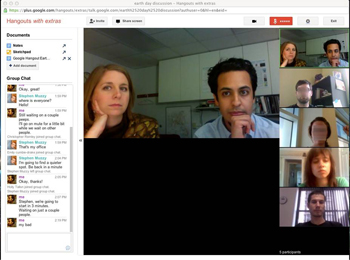By Carlos Ochoa, Interim Director, University of Arkansas Office for Campus Sustainability
(This article appears in the April, 2012 issue of The ACUPCC Implementer)
The University of Arkansas Office for Campus Sustainability is changing. We have new members on board including an interim-director, five interns, and newly appointed executive director for Campus Sustainability, who will report directly to the provost. Via Dave Newport’s blog on the Death of Campus Sustainability, we see a changing tide of sustainability in higher education across the nation. Technologically, we’re seeing new social media platforms rising (think Klout, Kred, Pinterest, and Google+). Change is scary but our office is using it to our advantage.
 In March, our office held our first Google Hangout via Google+ to discuss Earth Day 2012 on college campuses across the US. We openly invited people from every listserv and outlet we know to participate in a free videoconference on Google+. Several sustainability folks in higher education participated in the event. Emily Cumbie-Drake from Emory, Chris Remley from Carleton College, Steve Muzzy from Second Nature, Shannon Remley from the University of Arkansas Applied Sustainability Center, and a RecycleMania intern and I represented the UA Office for Campus Sustainability. There’s a slight learning curve that prevented several people from participating and that’s okay because there’s more to this story than new technological innovations.
In March, our office held our first Google Hangout via Google+ to discuss Earth Day 2012 on college campuses across the US. We openly invited people from every listserv and outlet we know to participate in a free videoconference on Google+. Several sustainability folks in higher education participated in the event. Emily Cumbie-Drake from Emory, Chris Remley from Carleton College, Steve Muzzy from Second Nature, Shannon Remley from the University of Arkansas Applied Sustainability Center, and a RecycleMania intern and I represented the UA Office for Campus Sustainability. There’s a slight learning curve that prevented several people from participating and that’s okay because there’s more to this story than new technological innovations.
We chatted about Earth Day but we also touched on topics that are on the minds of all sustainability specialists in higher education. Each participant discussed Earth Day events on their campus, past events, and suggestions of how they might have done it different. We discussed participation in the American College and University Presidents’ Climate Commitment, or lack thereof, and why. Some institutions, it was discovered, may feel that the ACUPCC helps to guide their commitment to carbon neutrality, which is needed and helpful, whereas other institutions may feel that they can walk on their own. There are different paths to zero-waste, or carbon neutrality and mitigation, just as there are many paths to the Buddha. In a sense, the discussion that unfolded was how do we keep “this” going? It wasn’t explicitly expressed, but it was there. The discussion turned from Earth Day to student engagement, student empowerment, administrative support, et cetera. We were tacitly asking each other, “How do we keep sustainability relevant?” It wasn’t until after our Hangout that I realized that keeping dialogue flowing is tantamount to keeping sustainability relevant.
The Death of Campus Sustainability highlighted the uneasy feeling that sustainability in higher education is waning. It’s perhaps a visceral feeling amongst those who have made it their life’s mission to increase social justice, reduce carbon emissions, reduce waste, increase recycling, and protect natural resources. Many people in this field feel as if they have hit a plateau or encountered a point of diminishing returns. This dénouement is, as Dave Newport describes, the death of sustainability in higher education. Sure, Dave has offered some words of advice onresuscitating sustainability in his latest blog entry but he forgot to mention that keeping the dialogue afloat is needed to maintain momentum, pick up the lull, and attain sustainability nirvana.
The Hangout, or any form of engagement that keeps the dialogue open, keeps this death described by Dave Newport at bay. Grow the dialogue, collaborate, and keep it fluid. Discussion is key and will unlock the next phase of sustainability in higher education. Dave, while discussing the “interconnectedness of everything” (i.e. economical, environmental, and social), says we must “connect the dots” to keep sustainability afloat but we must also continue to connect the dots between all of our institutions of higher education, no matter our affiliations, no matter our challenges or changes.
As far as Earth Day is concerned, the University of Arkansas is planning several events. The Student Sustainability Council will host a bicycle awareness day. The Applied Sustainability Center and the UA Associated Student Government will co-host a series of speakers from corporate sustainability offices. Students who are enrolled in the Sustainability Minor will showcase their capstone projects. The Office for Campus Sustainability will host an Earth Day vendor fair to showcase some of the Natural States environmental education, awareness, and stewardship organizations.
We’re also pairing up with a somewhat unusual champion of campus sustainability: The Quality Writing Center. We’ll be recruiting students throughout April for a Student Sustainability Blogging Competition to begin in the fall semester. Students will be encouraged to write about sustainability on one particular theme (GHG emissions, water conservation, population growth, waste reduction, recycling, and whatever else they might be interested in writing). The students will also be judged on their ability to include a social value of sustainability solutions. For example, what is the social value of local, sustainable agriculture, water conservation, or renewable energy? We’re hoping to foster a systems thinking approach to problem solving, forge partnerships across campus, and begin the dialogue of a full-cost value proposition.
If you like, you can find me on Google+ and we can keep the conversation going in a Hangout. I’ll even share my sustainability circle with you.

Add new comment